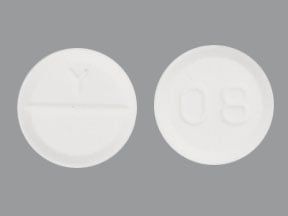
Glycopyrrolate Coupons & Savings Card – Discount Prices from $8.69
Generic for: Robinul, Robinul-forte, Cuvposa
My prescription
Edit
1MG, Glycopyrrolate (60 Tablets)
Select pharmacy

CVS
$21.80
COUPON PRICE
Walmart
$8.69
COUPON PRICE
Walgreens
$15.30
COUPON PRICE
Albertsons
$19.21
COUPON PRICEGlycopyrrolate savings card
Show this card to your pharmacist
Walmart
$8.69
BIN
ID
PCN
GRP
019876
LH1A3A41A2
CHIPPO
LHX
Powered by
More prescriptions for salivation
More prescriptions for salivation
Price history for Dartisla Odt (brand) & Glycopyrrolate (generic)
60 Tablets, 1MG
Average retail price for Dartisla Odt
Average retail price for Glycopyrrolate
Average SaveHealth price for Glycopyrrolate
Our price history data is based on aggregated prescription data collected from participating pharmacies in America. Our prescription data updates daily to reflect the latest price changes. If you notice a missing data point, it means there wasn't sufficient data available to generate a monetary value for that date.
We analyzed Glycopyrrolate prices for (1MG, 60 Tablets) over the last 12 months. The average retail price was $73.75, while the average price using the SaveHealth discount card was $21.68. That's a savings of approximately 70.60% when using our Glycopyrrolate coupon.
Compared to the generic version, Dartisla Odt had an average price of $209.33 over the same time period. With the SaveHealth savings card, Glycopyrrolate is 89.64% cheaper on average than Dartisla Odt.
*Retail prices are based on pharmacy claims data, and may not be accurate when we don't have enough claims.
Glycopyrrolate dosage forms
Dosage Quantity Price from Per unit 1MG 60 Tablets $8.69 $0.14 1MG 1 Tablet $2.60 $2.60 1MG 30 Tablets $5.59 $0.19 1MG 50 Tablets $7.66 $0.15 1MG 90 Tablets $18.28 $0.20 1MG 100 Tablets $19.31 $0.19 1.5MG 30 Tablets $231.02 $7.70 2MG 60 Tablets $14.44 $0.24 2MG 90 Tablets $26.90 $0.30 2MG 100 Tablets $28.89 $0.29
| Dosage | Quantity | Price from | Per unit |
|---|---|---|---|
| 1MG | 60 Tablets | $8.69 | $0.14 |
| 1MG | 1 Tablet | $2.60 | $2.60 |
| 1MG | 30 Tablets | $5.59 | $0.19 |
| 1MG | 50 Tablets | $7.66 | $0.15 |
| 1MG | 90 Tablets | $18.28 | $0.20 |
| 1MG | 100 Tablets | $19.31 | $0.19 |
| 1.5MG | 30 Tablets | $231.02 | $7.70 |
| 2MG | 60 Tablets | $14.44 | $0.24 |
| 2MG | 90 Tablets | $26.90 | $0.30 |
| 2MG | 100 Tablets | $28.89 | $0.29 |
| 2MG | 180 Tablets | $45.70 | $0.25 |
